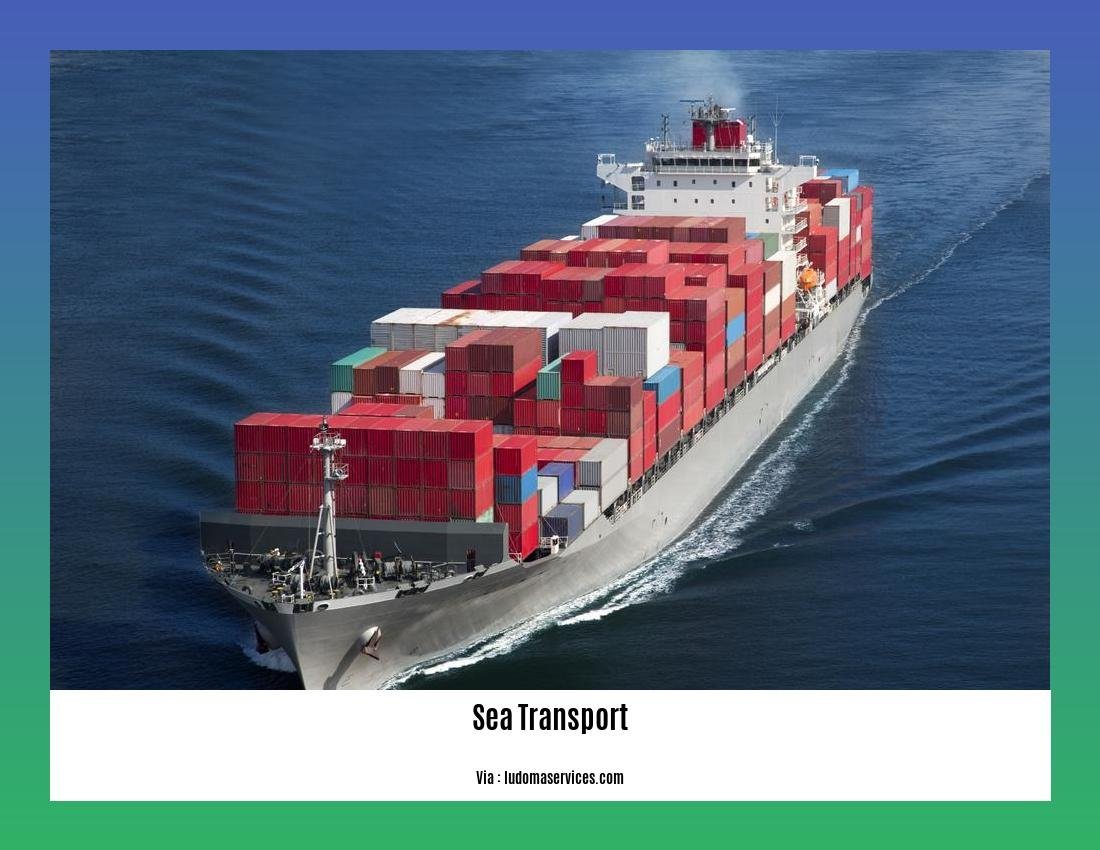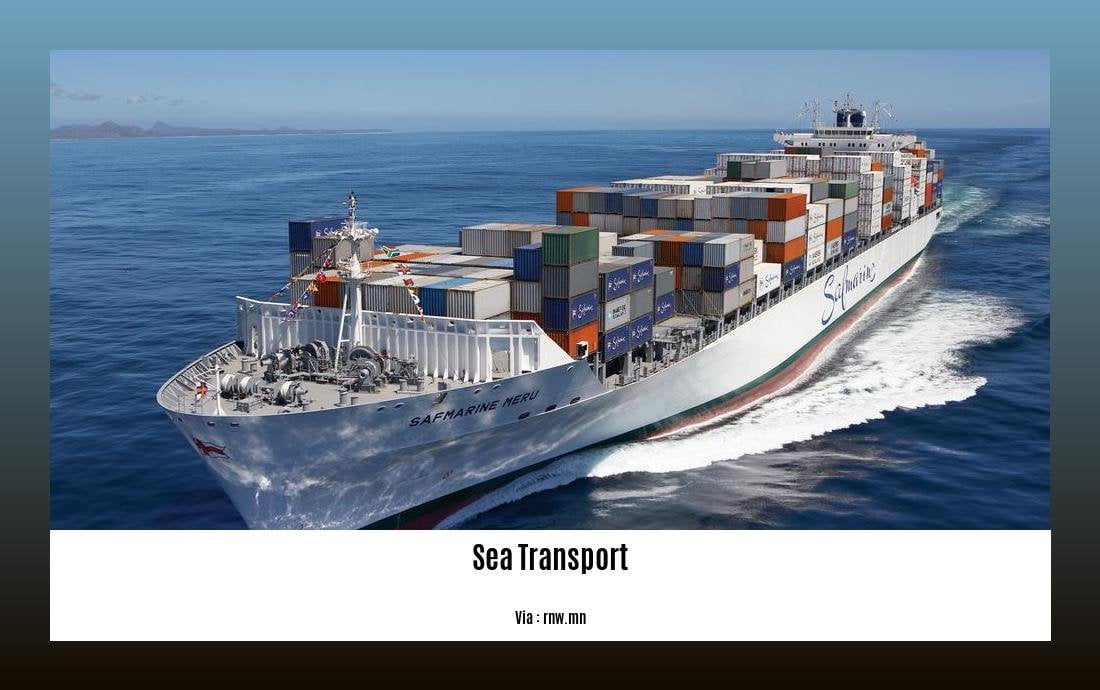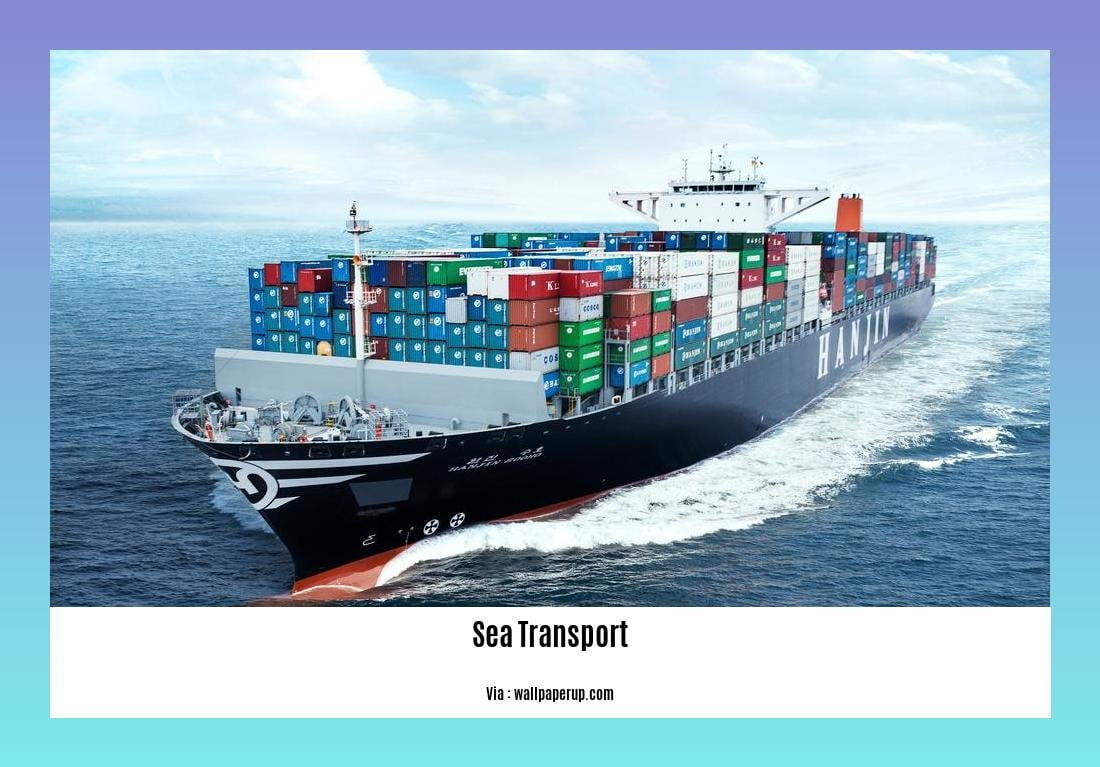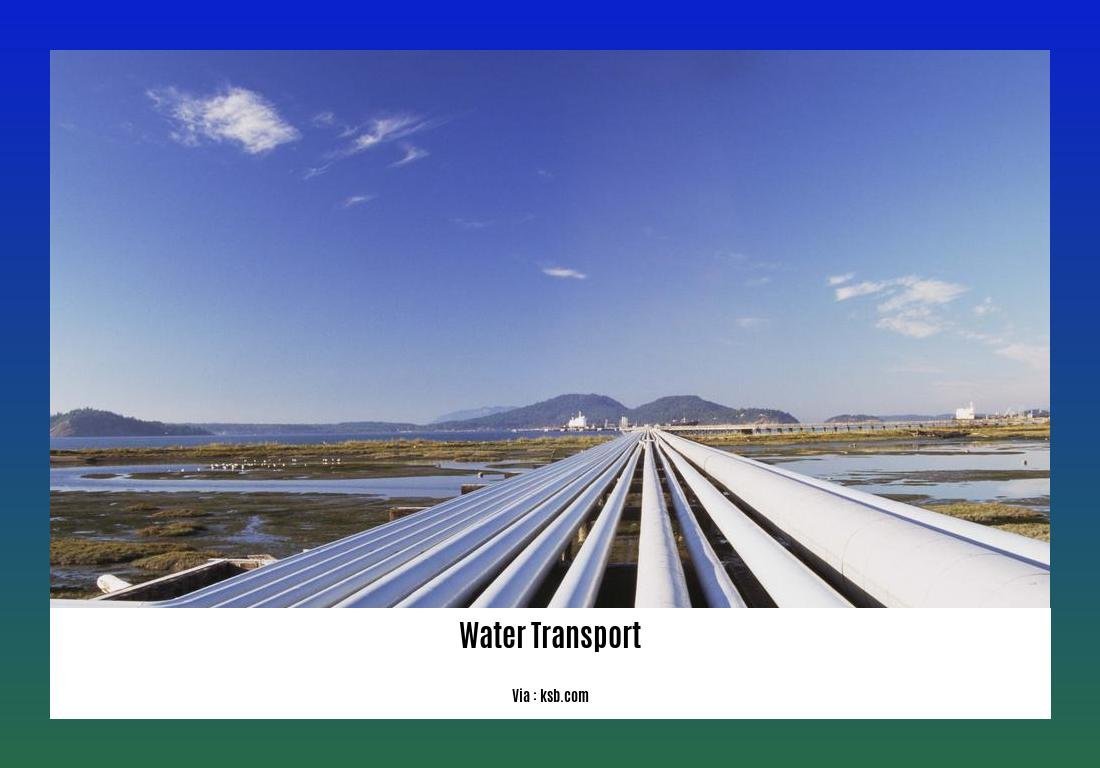In today’s global marketplace, businesses are constantly seeking efficient and cost-effective solutions for their supply chain operations. When it comes to international trade, sea transport emerges as a standout option that offers numerous advantages and benefits. From its ability to handle large volumes of cargo to its cost-effectiveness and eco-friendliness, sea transport has become a trusted choice for businesses worldwide. In this article, we will explore the advantages and benefits of sea transport and shed light on why it has become a vital component of global commerce.
Key Takeaways:
- Sea transport offers numerous benefits for businesses worldwide.
- Efficient sea transport can streamline supply chain operations and optimize costs.
- Timely delivery of goods is ensured through effective coordination and execution of international shipments.
- In-depth understanding of maritime regulations, carrier networks, and freight management systems is essential for successful sea transport operations.
- Sea transport provides businesses with a reliable and cost-effective option for transporting goods worldwide.
Benefits of Sea Transport

Sea transport, also known as shipping or maritime transportation, offers numerous advantages and benefits for businesses worldwide. Whether you’re operating locally or internationally, utilizing sea transport can bring significant cost savings, efficiency improvements, and logistical advantages. In this article, we will explore some of the key benefits of sea transport and how it can positively impact your business operations.
Cost Savings
One of the primary advantages of sea transport is its cost-effectiveness. Shipping goods by sea is often more affordable compared to other modes of transportation, such as air or road. The ability to transport large volumes of cargo in a single shipment significantly reduces per-unit costs, making it an attractive option for businesses that deal with bulk commodities or heavy goods. Whether you’re importing or exporting goods, sea transport allows you to save money on transportation expenses, thus contributing to higher profit margins.
Moreover, sea transport offers competitive freight rates due to economies of scale. The shipping industry is highly competitive, with numerous shipping companies operating on various trade routes. This competition drives down prices, allowing businesses to negotiate favorable contracts and secure cost-efficient shipping solutions. By leveraging the extensive carrier networks and available shipping options, businesses can optimize their supply chain costs and improve overall profitability.
Global Reach and Connectivity
Sea transport provides businesses with unparalleled global reach and connectivity. With access to major ports and shipping routes around the world, businesses can easily establish connections with international markets and extend their customer base. The extensive network of shipping routes ensures that even remote locations can be reached efficiently, enabling trade and commerce in regions that may otherwise be logistically challenging.
Furthermore, sea transport enables the transportation of a wide range of goods, including both perishable and non-perishable items. From raw materials and agricultural products to electronics and automobiles, sea transport facilitates the movement of diverse commodities across borders. This versatility makes it an ideal choice for businesses operating in various industries, ensuring their goods can be transported reliably and efficiently to destinations worldwide.
Reliability and Safety
When it comes to reliability and safety, sea transport provides businesses with peace of mind. Dedicated shipping companies and maritime authorities invest heavily in ensuring the safety of vessels, cargo, and crew. Strict regulations and industry standards govern maritime operations, with robust protocols in place to prevent accidents and mishaps. This emphasis on safety ensures that goods are transported securely, minimizing the risk of damage or loss during transit.
Sea transport also boasts reliable schedules, minimizing the chances of delays and disruptions. Shipping companies carefully plan routes, taking into account factors such as weather conditions and port congestion, to ensure timely delivery of cargo. Choosing reputable shipping companies with a proven track record further enhances reliability and helps businesses maintain their supply chain efficiency.
Environmental Sustainability
In an era where businesses are increasingly conscious of their environmental impact, sea transport offers a greener alternative to other transportation modes. Ships have a significantly lower carbon footprint compared to airplanes or trucks, thanks to their large carrying capacity and fuel efficiency. By shifting a portion of their logistics operations to sea transport, businesses can reduce their overall carbon emissions and contribute to sustainability efforts.
The maritime industry is committed to environmental responsibility and continuously seeks ways to minimize its ecological impact. Many shipping companies invest in fuel-efficient vessels, utilize cleaner fuels, and implement measures to reduce air and water pollution. This commitment to sustainability aligns with the goals of businesses striving for environmentally friendly practices while ensuring their goods are transported efficiently and reliably.
Conclusion
Sea transport offers a multitude of benefits for businesses worldwide. From cost savings and global reach to reliability and environmental sustainability, it is evident that leveraging sea transport can significantly enhance a company’s supply chain operations. By understanding the advantages of sea transport and making informed decisions based on their specific logistical requirements, businesses can unlock opportunities for growth, efficiency, and profitability, while simultaneously contributing to a more sustainable future.
To discover the countless benefits of air transportation, click here: benefit of air transportation
Explore the advantages of an intelligent transport system by clicking on this link: benefits of intelligent transport system
Unlock the benefits and significance of the Panama Canal by clicking here: benefits of the Panama Canal
Dive into the advantages of water transport and its impact by clicking on this link: benefits of water transport
Sea Transport Enables Businesses to Reach Global Markets

Sea transport is a vital aspect of international trade, enabling businesses to expand their horizons and tap into global markets. With its unmatched reach and capacity, sea transport offers numerous advantages for businesses worldwide. From cost-effectiveness to reliability, this mode of transportation plays a crucial role in connecting businesses with customers around the globe.
The Versatility of Sea Transport
One of the key benefits of sea transport is its versatility. Ships have the capacity to transport a wide range of goods, making it suitable for businesses in various industries. Whether it’s heavy machinery, perishable goods, or consumer products, sea transport can handle diverse cargo requirements. This flexibility allows businesses to fully leverage their global supply chains and cater to the demands of international customers.
Expansion into New Markets
Sea transport enables businesses to reach distant shores and establish connections with international markets. By expanding their reach beyond domestic boundaries, companies can tap into new customer bases and unlock growth opportunities. With sea transport, businesses can easily access markets that were previously out of their reach, allowing them to expand their operations and increase their market share.
Cost Savings and Competitive Advantage
Sea transport offers significant cost savings compared to other modes of transportation. Ships have a larger carrying capacity, allowing businesses to transport more goods in a single journey. This economy of scale translates into lower shipping costs per unit, giving businesses a competitive advantage in pricing their products. The shipping industry’s competitiveness also leads to attractive freight rates and cost-efficient shipping solutions, further enhancing the cost-effectiveness of sea transport.
Reliable and Safe Operations
When it comes to reliability and safety, sea transport has a commendable track record. The maritime industry is subject to strict regulations and industry standards that ensure the safety of ships, crew, and cargo. With advanced navigation systems, rigorous inspections, and trained personnel, sea transport provides businesses with peace of mind, knowing that their goods will reach their destination safely and on time. This reliability builds trust and strengthens the reputation of businesses among their customers.
Environmental Responsibility
Sea transport offers a greener alternative to other modes of transportation. Ships have a lower carbon footprint compared to airplanes or trucks, making them a more environmentally friendly choice. The maritime industry is committed to environmental responsibility and continuously seeks ways to minimize its ecological impact. Initiatives such as using cleaner fuels, implementing energy-efficient technologies, and investing in eco-friendly practices contribute to reducing emissions and preserving the marine ecosystem.
Key Takeaways:
- Sea transport enables businesses to expand into new markets and reach customers on a global scale.
- The versatility of sea transport allows for the transportation of various types of goods, accommodating the needs of businesses in different industries.
- Businesses can benefit from cost savings and gain a competitive advantage by utilizing sea transport’s larger carrying capacity and attractive freight rates.
- Sea transport provides reliable and safe operations, ensuring the timely delivery of goods and building trust among customers.
- Choosing sea transport contributes to environmental responsibility, as ships have a lower carbon footprint compared to other modes of transportation.
Sources:
- Maritime UK – Why use the sea?
- The Role of Sea Transport in Globalization
Note: The above article is for informational purposes only and does not constitute professional advice.
Sea Transport Provides Reliable and Predictable Delivery Schedules
Sea transport is a vital component of global trade, offering businesses a reliable and predictable solution for delivering their goods across the world. With strict regulations, advanced tracking systems, and experienced professionals, sea transport ensures that businesses can trust their shipments to arrive on time. In this article, we will delve into the advantages and benefits of sea transport in providing reliable and predictable delivery schedules for businesses worldwide.
The Value of Reliable and Predictable Delivery Schedules
Reliability and predictability are crucial factors for businesses when it comes to transporting their goods. Timely delivery ensures customer satisfaction, maintains business relationships, and prevents disruptions to supply chains. Sea transport excels in this aspect, offering several advantages that contribute to its ability to provide reliable and predictable delivery schedules.
Efficiency and Infrastructure
Sea transport operates on a well-established infrastructure, including ports, shipping lines, and container terminals. This extensive network means that goods can be transported seamlessly from one location to another. Ships are built to withstand various weather conditions and can adapt to potential disruptions, ensuring that schedules are maintained as closely as possible.
Advanced Tracking and Communication Systems
In today’s digital age, technology plays a crucial role in ensuring the reliability of sea transport. Advanced tracking systems allow businesses to monitor the progress of their shipments in real-time. From the moment goods are loaded onto a vessel to their final destination, businesses can track their shipments’ location, estimated arrival time, and any potential delays. This transparency allows for effective communication with customers and the ability to address any issues promptly, minimizing disruptions to delivery schedules.
Containerization and Consolidation
Containerization has revolutionized the shipping industry, providing businesses with a secure and efficient method of transporting goods. The use of standardized containers ensures that shipments are protected from damage, theft, and adverse weather conditions. Additionally, containerization enables the consolidation of goods from multiple suppliers into a single container, further optimizing costs and reducing the risk of delays.
Expertise and Professionalism
Sea transport professionals, including logistics providers and carriers, are highly experienced in managing and executing international shipments. They have a deep understanding of maritime regulations, carrier networks, and freight management systems. With their expertise, businesses can rely on their guidance and support in optimizing delivery schedules, choosing the most appropriate shipping routes, and navigating potential challenges.
Key Takeaways:
- Sea transport offers businesses reliable and predictable delivery schedules, ensuring customer satisfaction and supporting supply chain operations.
- The efficiency and infrastructure of sea transport contribute to its ability to maintain delivery schedules with minimal disruptions.
- Advanced tracking and communication systems allow businesses to monitor their shipments in real-time and address any potential delays promptly.
- Containerization and consolidation optimize delivery schedules by ensuring the protection of goods and reducing the risk of delays.
- The expertise and professionalism of sea transport professionals contribute to the reliability and predictability of delivery schedules.
-Sources:
1. Maritime Transport Efficiency and CO2 Reduction
2. The Advantages of Sea Freight Shipping
Sea Transport: An Environmentally Friendly Solution for Businesses
In the fast-paced world of international logistics, businesses are constantly seeking efficient and sustainable transportation options. And when it comes to reducing carbon emissions and minimizing environmental impact, sea transport emerges as a clear frontrunner. Let’s explore the advantages and benefits of sea transport from an environmental perspective.
The Green Alternative
Sea transport, often overlooked in favor of air or road transport, holds immense potential to contribute to a greener supply chain. Compared to other modes of transportation, such as airplanes or trucks, ships have a significantly lower carbon footprint. This is due to their high carrying capacity and fuel efficiency, enabling them to transport large volumes of cargo while consuming relatively less fuel.
Reducing Carbon Emissions
Sea transport plays a crucial role in reducing carbon emissions, making it an attractive choice for environmentally conscious businesses. Ships rely on fossil fuels to power their engines, but technological advancements and stringent regulations have led to improved fuel efficiency and reduced emissions. Additionally, the shipping industry is actively exploring alternative energy sources, such as liquefied natural gas (LNG) and electric propulsion, to further minimize carbon emissions.
Embracing Sustainability
The maritime industry recognizes the importance of embracing sustainability and minimizing its ecological impact. Through the implementation of environmental management systems and adherence to strict regulations, shipping companies are committed to reducing air and water pollution, protecting marine ecosystems, and conserving natural resources.
Key Takeaways:
- Sea transport is a green alternative, with ships emitting significantly lower carbon emissions compared to airplanes or trucks.
- Technological advancements and regulations are driving improved fuel efficiency and reduced emissions in the maritime industry.
- The shipping industry is actively exploring alternative energy sources to further minimize carbon emissions.
- By embracing sustainability, shipping companies are actively working towards reducing pollution and protecting marine ecosystems.
Sources:
– International Maritime Organization (IMO)
– Sea Cargo Charter
FAQ
Q1: What are the main benefits of using sea transport for businesses?
A1: Sea transport offers several key benefits for businesses, including cost-effectiveness, the ability to transport large quantities of goods, and access to a global network of ports for international trade.
Q2: How does sea transport help businesses optimize their costs?
A2: Sea transport is known for its cost-effectiveness, as it allows businesses to transport goods in large quantities at a lower cost per unit. By using cargo ships, businesses can benefit from economies of scale, reducing their overall transportation expenses.
Q3: Can sea transport accommodate large and bulky goods?
A3: Yes, sea transport is highly suitable for transporting large and bulky goods. Cargo ships have the capacity to carry heavy equipment, machinery, vehicles, and even oversized items that may not be feasible or cost-effective to transport by other means.
Q4: What are the advantages of sea transport for international trade?
A4: Sea transport plays a critical role in international trade by providing access to a global network of ports. This enables businesses to reach customers and suppliers worldwide, facilitating import and export activities, and promoting economic growth on a global scale.
Q5: How does sea transport contribute to reducing carbon emissions and promoting sustainability?
A5: Sea transport is recognized as a more environmentally-friendly mode of transportation compared to other options, such as air or road transport. By utilizing larger vessels and transporting goods in bulk, sea transport helps to reduce carbon emissions, congestion on roads, and fuel consumption, making it a greener choice for businesses seeking sustainable logistics solutions.
- HelpCare Plus: Revolutionizing Affordable and Accessible Healthcare - December 29, 2024
- Boom & Bucket: Your Digital Marketplace for Used Heavy Equipment - December 28, 2024
- Ankle Bones Crossword Clue: Solutions, Tips & Anatomical Insights - December 28, 2024














